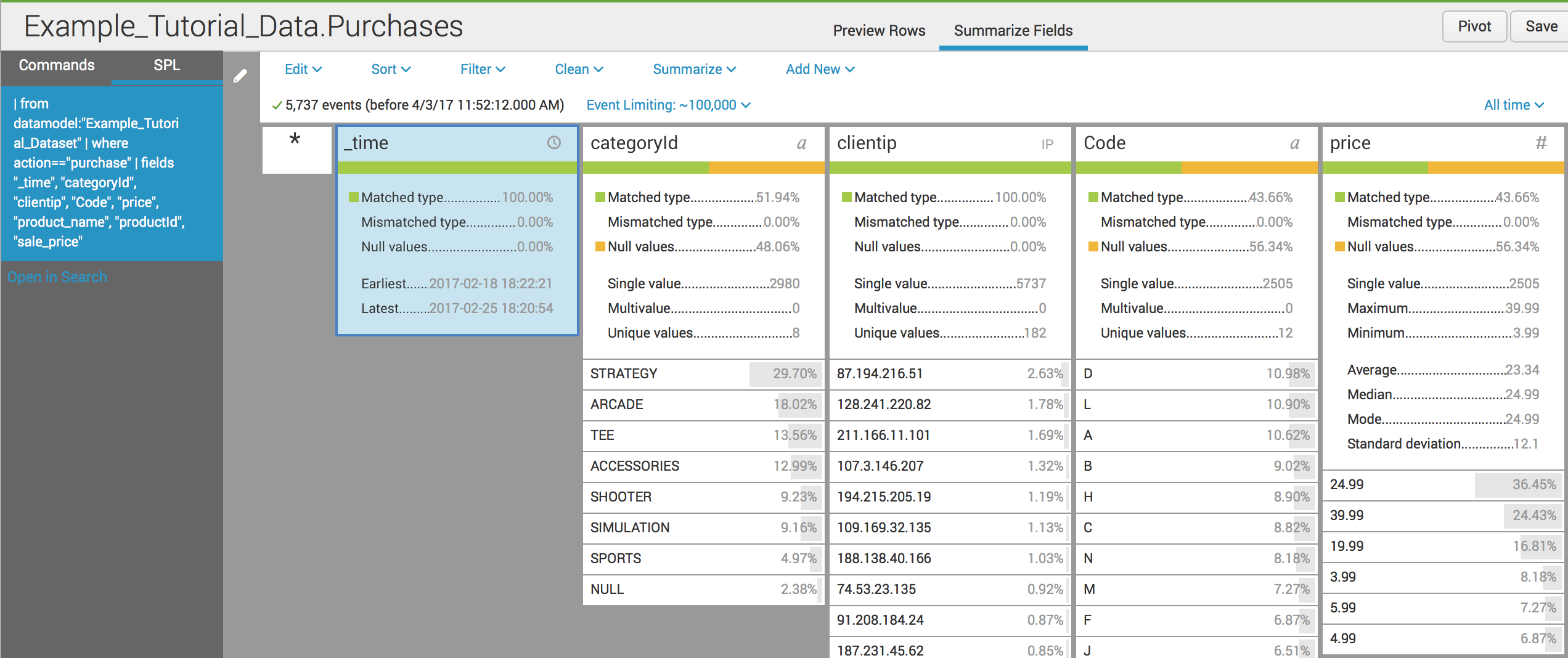

Returns results in a tabular output for (time-series) chartingĬalculates an expression (see Calculations) Note the decreasing number of results below: Finding entries without IPv4 address on sample data Common Search Commands Command It is a process of narrowing the data down to your focus. Search commands help filter unwanted events, extract additional information, calculate values, transform data, and statistically analyze the indexed data. Here is an example of an event in a web activity log: It can be a text document, configuration file, or entire stack trace. Unless you’re joining two explicit Boolean expressions, omit the AND operator because Splunk assumes the space between any two search terms to be AND.īasic Search offers a shorthand for simple keyword searches in a body of indexed data myIndex without further processing:Īn event is an entry of data representing a set of values associated with a timestamp. Splunk uses what’s called Search Processing Language (SPL), which consists of keywords, quoted phrases, Boolean expressions, wildcards (*), parameter/value pairs, and comparison expressions. The Search Head is for searching, analyzing, visualizing, and summarizing your data.The Forwarder (optional) sends data from a source.The Indexer parses and indexes data added to Splunk.Splunk contains three processing components: Splunk Enterprise search results on sample data

With Splunk, not only is it easier for users to excavate and analyze machine-generated data, but it also visualizes and creates reports on such data. The Internet of Things (IoT) and Internet of Bodies (IoB) generate much data, and searching for a needle of datum in such a haystack can be daunting. Frequently Asked Questions Brief Introduction of Splunk.Your_search_criteria |eval xmessagePayload = messagePayload | spath input=xmessagePayload output=xorderID path=ord:AddOrderV2.ord:order. Your_search_criteria ConcurrentModificationException| timechart count as Exceptions_Count span=1h useother=f |appendcols Your_search_criteria | eval responseXML=replace(_raw,"^(*)WORD_TOBE_SEARCHED","")| spath input=responseXML path=XXXX.YYY output=filed_output | table filed_output Search for a Word using regular expression and retrieving fields on Your_search_criteria | rex max_match=0 field=_raw "(?m)\n(?. Splunk regex by default searches single line, to make regex for multiline (?m) and to match all the results matching regex Search your_search_with Valid as a field|| eval var=if(Valid > 10, "false", "true")Įx: |table Date, _time, File, Valid, Invalid|addcoltotals | sort - _time descĪdds all the columns in a search results and displays another columnĮx: |table Date, _time, File, Valid, Invalid|addtotals fieldname=sum Dashboards Rex max_match=0 field=_raw "VendorPartNumber\": \"(? \w*)\"" | mvexpand VendorNum | table VendorNum Search inv_sync_file= FILE_NAME.XML | eval Date=strftime(_time, "%+"), File = inv_sync_file| Index=INDEX_NAME host=HOST_NAME "" | sort - _time desc |table host,_time | bin _time span=300sec | dedup _time Search | convert timeformat="%Y-%m-%d" ctime(_time) AS date | stats count by date Index=index_name sourcetype=exception_source_typs host=host_name "" | sort - _time desc |table host,_time,source | bin _time span=300sec | dedup _timeĭisplay Detailed Information on All Fields Available Within a SearchĬonvert _time to a date in the needed forma Index=index_name sourcetype=exception_source_typs host=host_name LifecycleException | stats count by originApplication Index=index_name sourcetype=exception_source_typs host=host_name LifecycleException | bucket _time span=day |stats count by _timeĬount of search criteria "LifecycleException" by app Index=index_name sourcetype=source_type host=host_nam source=sourceĬount of search criteria "LifecycleException" per day


 0 kommentar(er)
0 kommentar(er)
